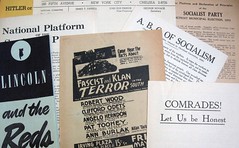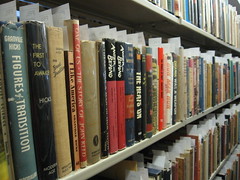The Department of Special Collections and University Archives is home to two separate collections of radical socialist and communist related materials. These are the Harold Leventhal proletarian archive (coll. no. 2006.003) and the Peter Howard proletarian library. There are other similar materials that are not part of these collections that have been brought together under the aegis of “radical thought.”
As an aside, the “proletarian” in the name of these collections refers to the lower or working classes, and to a certain extent the proletarian revolution predicted by Karl Marx. In a broader sense, it refers to the working class self-exploration and self-definition through its literature and politics.
The first collection, the Harold Leventhal proletarian archive, 1902-1975 was acquired by then McFarlin Library director, Guy Logsdon around 1977. Harold Leventhal was a folk music manager handling such musicians as the Weavers, Woody Guthrie, Peter, Paul and Mary and Joan Baez. He was also a passionate and devoted Communist.
The Harold Leventhal proletarian archive and library contain a wide variety of early and mid-20th century communist and socialist leaflets and pamphlets, sheet music, article clippings, internal documents, campaign cards, poetry, and a selection of correspondence of the noted activist Ammon Hennacy, among other things. There is also a library of 363 published titles that have been placed into our catalog under the subject “Harold Leventhal Proletarian Library.”
Early in 1980, McFarlin Library acquired a major collection of proletarian literature that had been brought together by the late bookman Peter B. Howard. The collection was based on Walter Rideout’s The Radical Novel in the United States, 1900-1954. However, this collection of over 2, 000 items goes beyond the genre Rideout studied. In addition to novels by such figures as Upton Sinclair, Sherwood Anderson, Edward Dahlberg, Maxwell Bodenheim, James T. Farrell, Josephine Herbst, Waldo Frank, Nelson Algren, Dalton Trumbo, and Norman Mailer, there are plays, poetry, anthologies, ephemeral and fugitive pieces of proletarian writing, music, and periodicals. Many items in the collection are practically impossible to bring together at this point in time, so they are especially valuable for the study of interrelations between literature and society. They can be searched in the catalog using the subject heading “Peter Howard Proletarian Library.”


